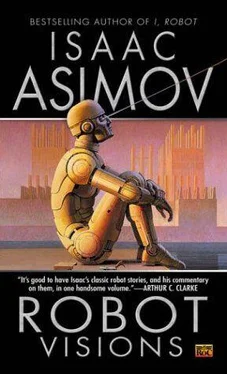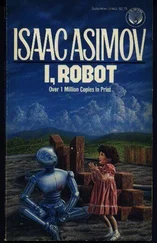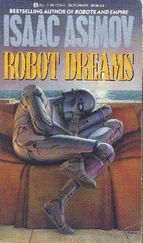Isaac Asimov - Robot Visions
Здесь есть возможность читать онлайн «Isaac Asimov - Robot Visions» весь текст электронной книги совершенно бесплатно (целиком полную версию без сокращений). В некоторых случаях можно слушать аудио, скачать через торрент в формате fb2 и присутствует краткое содержание. Жанр: Фантастика и фэнтези, на английском языке. Описание произведения, (предисловие) а так же отзывы посетителей доступны на портале библиотеки ЛибКат.
- Название:Robot Visions
- Автор:
- Жанр:
- Год:неизвестен
- ISBN:нет данных
- Рейтинг книги:5 / 5. Голосов: 1
-
Избранное:Добавить в избранное
- Отзывы:
-
Ваша оценка:
- 100
- 1
- 2
- 3
- 4
- 5
Robot Visions: краткое содержание, описание и аннотация
Предлагаем к чтению аннотацию, описание, краткое содержание или предисловие (зависит от того, что написал сам автор книги «Robot Visions»). Если вы не нашли необходимую информацию о книге — напишите в комментариях, мы постараемся отыскать её.
Robot Visions — читать онлайн бесплатно полную книгу (весь текст) целиком
Ниже представлен текст книги, разбитый по страницам. Система сохранения места последней прочитанной страницы, позволяет с удобством читать онлайн бесплатно книгу «Robot Visions», без необходимости каждый раз заново искать на чём Вы остановились. Поставьте закладку, и сможете в любой момент перейти на страницу, на которой закончили чтение.
Интервал:
Закладка:
“I am designing a system for allowing androids- myself- to gain energy from the combustion of hydrocarbons, rather than from atomic cells.”
Paul raised his eyebrows. “So that they will breathe and eat?”
“Yes.”
“How long have you been pushing in that direction?”
“For a long time now, but I think I have finally designed an adequate combustion chamber for catalyzed controlled breakdown.”
“But why, Andrew? The atomic cell is surely infinitely better.”
“In some ways, perhaps. But the atomic cell is inhuman.”
It took time, but Andrew had time. In the first place, he did not wish to do anything till Paul had died in peace. With the death of the great-grandson of Sir, Andrew felt more nearly exposed to a hostile world and for that reason was all the more determined along the path he had chosen.
Yet he was not really alone. If a man had died, the firm of Feingold and Martin lived, for a corporation does not die any more than a robot does.
The firm had its directions and it followed them soullessly. By way of the trust and through the law firm, Andrew continued to be wealthy. In return for their own large annual retainer, Feingold and Martin involved themselves in the legal aspects of the new combustion chamber. But when the time came for Andrew to visit U.S. Robots and Mechanical Men Corporation, he did it alone. Once he had gone with Sir and once with Paul. This time, the third time, he was alone and manlike.
U.S. Robots had changed. The actual production plant had been shifted to a large space station, as had grown to be the case with more and more industries. With them had gone many robots. The Earth itself was becoming park like, with its one-billion-person population stabilized and perhaps not more than thirty percent of its at-least-equally-large robot population independently brained.
The Director of Research was Alvin Magdescu, dark of complexion and hair, with a little pointed beard and wearing nothing above the waist but the breast band that fashion dictated. Andrew himself was well covered in the older fashion of several decades back.
Magdescu offered his hand to his visitor. “I know you, of course, and I’m rather pleased to see you. You’re our most notorious product and it’s a pity old Smythe-Robertson was so set against you. We could have done a great deal with you.”
“You still can,” said Andrew.
“No, I don’t think so. We’re past the time. We’ve had robots on Earth for over a century, but that’s changing. It will be back to space with them, and those that stay here won’t be brained.”
“But there remains myself, and I stay on Earth.”
“True, but there doesn’t seem to be much of the robot about you. What new request have you?”
“To be still less a robot. Since I am so far organic, I wish an organic source of energy. I have here the plans-”
Magdescu did not hasten through them. He might have intended to at first, but he stiffened and grew intent. At one point, he said, “This is remarkably ingenious. Who thought of all this?”
“I did,” Andrew replied.
Magdescu looked up at him sharply, then said, “It would amount to a major overhaul of your body, and an experimental one, since such a thing has never been attempted before. I advise against it. Remain as you are.”
Andrew’s face had limited means of expression, but impatience showed plainly in his voice. “Dr. Magdescu, you miss the entire point: You have no choice but to accede to my request. If such devices can be built into my body, they can be built into human bodies as well. The tendency to lengthen human life by prosthetic devices has already been remarked on. There are no devices better than the ones I have designed or am designing. As it happens, I control the patents by way of the firm of Feingold and Martin. We are quite capable of going into business for ourselves and of developing the kind of prosthetic devices that may end by producing human beings with many of the properties of robots. Your own business will then suffer.
“If, however, you operate on me now and agree to do so under similar circumstances in the future, you will receive permission to make use of the patents and control the technology of both robots and of the prosthetization of human beings. The initial leasing will not be granted, of course, until after the first operation is completed successfully, and after enough time has passed to demonstrate that it is indeed successful.”
Andrew felt scarcely any First Law inhibition to the stern conditions he was setting a human being. He was learning to reason that what seemed like cruelty might, in the long run, be kindness.
Magdescu was stunned. “I’m not the one to decide something like this. That’s a corporate decision that would take time.”
“I can wait a reasonable time,” said Andrew, “but only a reasonable time.” And he thought with satisfaction that Paul himself could not have done it better.
It took only a reasonable time, and the operation was a success.
“I was very much against the operation, Andrew,” Magdescu said, “but not for the reasons you might think. I was not in the least against the experiment, if it had been on someone else. I hated risking your positronic brain. Now that you have the positronic pathways interacting with simulated nerve pathways, it might have been difficult to rescue the brain intact if the body had gone bad.”
“I had every faith in the skill of the staff at U.S. Robots,” said Andrew. “And I can eat now.”
“Well, you can sip olive oil. It will mean occasional cleanings of the combustion chamber, as we have explained to you. Rather an uncomfortable touch, I should think.”
“Perhaps, if I did not expect to go further. Self cleaning is not impossible. In fact, I am working on a device that will deal with solid food that may be expected to contain incombustible fractions- indigestible matter, so to speak, that will have to be discarded.”
“You would then have to develop an anus.”
“Or the equivalent.”
“What else, Andrew-?”
“Everything else.”
“Genitalia, too?”
“Insofar as they will fit my plans. My body is a canvas on which I intend to draw-”
Magdescu waited for the sentence to he completed, and when it seemed that it would not be, he completed it himself. “A man?”
“We shall see,” Andrew said.
“That’s a puny ambition, Andrew. You’re better than a man. You’ve gone downhill from the moment you opted to become organic.”
“My brain has not suffered.”
“No, it hasn’t. I’ll grant you that. But, Andrew, the whole new breakthrough in prosthetic devices made possible by your patents is being marketed under your name. You’re recognized as the inventor and you’re being honored for it- as you should be. Why play further games with your body?”
Andrew did not answer.
The honors came. He accepted membership in several learned societies, including one that was devoted to the new science he had established- the one he had called robobiology but which had come to be termed prosthetology. On the one hundred and fiftieth anniversary of his construction, a testimonial dinner was given in his honor at U.S. Robots. If Andrew saw an irony in this, he kept it to himself.
Alvin Magdescu came out of retirement to chair the dinner. He was himself ninety-four years old and was alive because he, too, had prosthetized devices that, among other things, fulfilled the function of liver and kidneys. The dinner reached its climax when Magdescu, after a short and emotional talk, raised his glass to toast The Sesquicentennial Robot.
Andrew had had the sinews of his face redesigned to the point where he could show a human range of emotions, but he sat through all the ceremonies solemnly passive. He did not like to be a Sesquicentennial Robot.
Читать дальшеИнтервал:
Закладка:
Похожие книги на «Robot Visions»
Представляем Вашему вниманию похожие книги на «Robot Visions» списком для выбора. Мы отобрали схожую по названию и смыслу литературу в надежде предоставить читателям больше вариантов отыскать новые, интересные, ещё непрочитанные произведения.
Обсуждение, отзывы о книге «Robot Visions» и просто собственные мнения читателей. Оставьте ваши комментарии, напишите, что Вы думаете о произведении, его смысле или главных героях. Укажите что конкретно понравилось, а что нет, и почему Вы так считаете.








